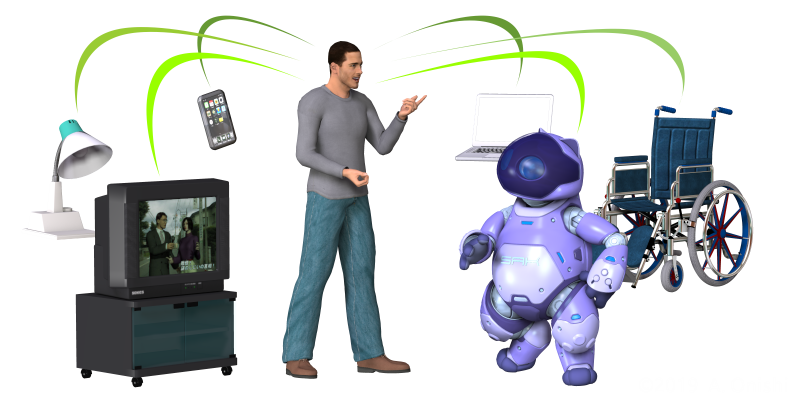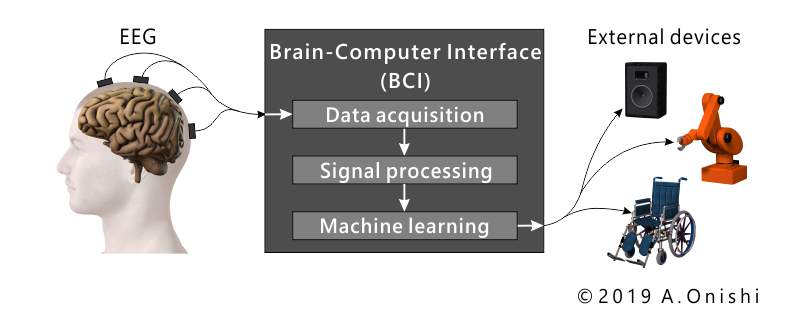Akinari ONISHI Ph.D.
Current Affiliation:
-
Senior lecturer
Department of Electronic Systems Engineering,
National Institute of Technology, Kagawa College
Researcher ID:
- KAKEN Researcher Number:20747969
- J-GLOBAL ID:201801007492160140
- ORCID ID:0000-0002-5566-1805
Research field:
- Biomedical engineering
- Assistive technology
- Human-computer interaction (HCI)
Keywords:
- Brain-computer interface (BCI), Brain-machine interface (BMI)
- Electroencephalography (EEG)
- Affect
- Self-organizing map (SOM)
- Landmark map (LAMA)
- Deep learning
Contact
I DO NOT RESPOND TO ANY DOUBTFUL INVITATIONS OR REQUESTS.

Research interest

I am researching on connecting humans and machines using biosignals. We use limbs to move vehicles, communicate with friends on smartphones, and design new things on computers. However, if we lost the functions of limbs due to accidents or illness, we cannot use those devices, and our life will be significantly limited. In order to overcome such situations, I'm studying on connecting humans and machines by reading weak signals such as brain waves from human bodies and converting them into commands for controlling machines. In particular, I'm conduct practical-research focusing on engineering technologies such as signal processing and machine learning. In addition, I'm working on applied-research on technologies developed in the course of research.
Study on Brain-Computer Interface (BCI)

Brain-Computer Interface (BCI) or Brain-Machine Interface (BMI) is an interface that converts signals generated from the brain into device control commands.
An example of BCI is shown in the figure. A weak electrical signal is generated from the human brain, which is called an electroencephalogram (EEG). The BCI measures brain waves from electrodes attached to the scalp and converts them into device control commands by applying signal processing and machine learning. For example, BCI can output commands to move the wheelchair back and forth, left and right. Furthermore, it can manipulate the robot arm and can play synthesized-speech and music from the speakers. In this way, you can operate assistive devices using brain waves by using BCI.
Even if we lose the function of limbs due to accidents or illnesses, BCI can be an alternative pathway to control assistive device and to communicate with others. Therefore, BCI is expected to encourage self-reliance and to improve the quality of life (QOL) for, e.g., people with severe motor dysfunction.
Publication
See Publications or Google Scholar.
Editorial board member experience
- Review Editor - Frontiers in Neuroscience (Neuroprosthetics) (2022~)
- Reviewer Board Member - Journal of Integrative Neuroscience (2024~)
Reviewer experience
I DO NOT RESPOND TO REVIEW REQUESTS FROM CURIOUS PUBLISHERS. I ONLY GAVE SERIOUS COMMENTS TO EACH ARTICLE. MOST OF MY REVIEWED ARTICLES WERE RECOMMENDED FOR REJECTION DUE TO ITS QUALITY.
See all Peer review history (more than 20 times).
Professional experience
- 2010-2012 Trainee, Brain Science Institute, RIKEN
- 2010-2012 Part-timer, Brain Science Institute, RIKEN
- 2012-2014 Research assistant, Department of Brain Science and Systems Engineering, Kyushu Institute of Technology
- 2013-2014 Part-time lecturer, Department of Clinical Engineer, Hakata Medical College
- 2014-2017 Postdoctoral researcher, Research Institute, National Rehabilitation Center for Persons with Disabilities
- 2017-2019 Research fellow, Center for Frontier Medical Engineering, Chiba University
- 2019-2020 Assistant professor, Center for Frontier Medical Engineering, Chiba University
- 2020-2022 Assistant professor, Department of Electronic Systems Engineering, National Institute of Technology, Kagawa College
- 2022-Present Senior lecturer, Department of Electronic Systems Engineering, National Institute of Technology, Kagawa College
Education
-
2010 B. Eng., Oita University
Mechatronics Program, Department of Architecture and Mechatronics, Faculty of Engineering -
2012 M. Eng., Kyushu Institute of Technology
Department of Brain Science and Engineering, Graduate School of Life Science and Systems Engineering -
2015 Ph. D., Kyushu Institute of Technology
Department of Brain Science and Engineering, Graduate School of Life Science and Systems Engineering
Title: Study on ensemble classifiers for event-related potential based brain computer interfaces